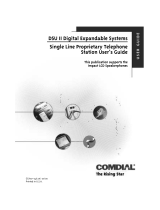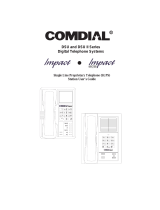Page is loading ...

DXP, DXP Plus, FXS, and FXT
Digital Communications System
Single Line Proprietary Telephone
Station User’s Guide
This publication supports the
Impact LCD Speakerphones
GCA70–251.09 05/00
printed in U.S.A.

This User’s Guide is for the following system :
DXP, DXPPlus, FXS and FXT
Digital Communication Systems.
This user’s guide applies to the following telephone models:
•
Impact 8101N-** Rev. A and later.
•
Impact 8201N-** Rev. A and later.
Contact your Comdial dealer for updates of this as well
as other Comdial publications.

About This Book
This user’s guide serves as both an introduction for new speakerphone users and a
reference for experienced users.
Introduction
Thefirstchapterof themanual describesthe initialsetup andadjustments necessary
to begin using your speakerphone.
1 Getting Started
The following chapters describe the basic and advanced features of the Common
Code Based DXP, DXP Plus, FXS and FXT systems.
2 Answering Calls
3 Making Calls
4 Advanced Call Handling
5 Nonverbal Messaging
6 Programming
7 Other Advanced Features
Following the advanced feature descriptions is a reference table, a glossary that
definesgeneralphrases/abbreviations whichmay not befamiliar tousersand allthe
features available for the DXP, DXP Plus, FXS and FXT systems.
Appendix A Quick Reference Guide
Appendix B Glossary
Appendix C Feature Networking Support
Finally, at the end of this publication, an index provides a detailed reference to the
feature locations.
Index
Single Line Proprietary Telephone Station User’s Guide iii
GCA70-251 Contents

NOTE: Throughout this book, all references to fixed buttons (keypad,
DSS/BLF, SPEAKER, HOLD, etc...) are printed in upper case, italic type; for
example, “PRESS INTERCOM.”
All references to interactive buttons (which are used to make selections on
the speakerphone display) are printed in upper case, bold italic type; for
example, “SELECT
OPTIONS
.”
Also, to eliminate confusion, the text of this guide instructs users to
“PRESS” fixed buttons of the telephone and “SELECT” interactive buttons
as in the examples above. Instructions to “DIAL” refer to numbers or
symbols on the keypad.
System-to-System Network
The system also provides capabilities for either a local stand-alone system or a
system-to-system network. System-to-system networking connects several DXP,
DXP Plus, FXS and FXT systems together in an arrangement that allows unified
communications through the system. For a complete list of features and their
properties see Appendix E, Feature Networking Support.
iv Single Line Proprietary Telephone Station User’s Guide
Contents GCA70-251

Contents
1 Getting Started ..................1
Setting Up Your Station ..............1
Your Station’s Buttons ...............4
Your Station’s Display Lights ...........6
2 Answering Calls .................7
Answering Outside Calls ..............7
Answering Intercom Calls .............7
Holding Calls ....................8
Call Pickup ....................10
Night-Transferred Calls -Line Access
From Any Station .................11
Receiving Subdued Off-Hook
Voice Announcements (SOHVA) .........12
3 Making Calls ...................13
Making Outside Calls ...............13
Making Intercom Calls ..............14
Automatic Dialing.................14
Camping On - Busy Station,
Automatic Callback ................15
Advanced Camping On Options .........16
Redialing .....................18
Single Line Proprietary Telephone Station User’s Guide iii
GCA70-251 Contents

4 Advanced Call Handling ............19
Waiting For ALine (Queuing) ..........19
Conferencing ...................20
Call Forwarding ..................22
Call Forward Outside System (CFOS) ......24
Call Transferring .................25
Other Call Transferring Options .........26
Call Parking ....................28
Paging .......................30
5 Nonverbal Messaging ..............31
LCD Message Delivery ..............31
Message Waiting Light and Messaging......34
6 Programming ..................35
Speed Dial Numbers ...............35
7 Other Advanced Features ...........37
Line Groups ....................37
Account Codes ..................38
Do Not Disturb Condition.............39
Tracker Paging System ..............40
Volume Control ..................42
Automatic Set Relocation .............44
A Feature Access Codes .............45
B Glossary .....................49
C Feature Networking Support ..........57
iv Single Line Proprietary Telephone Station User’s Guide
Contents GCA70-251

Getting Started
Welcome
CongratulationsandthankyouforusingaComdialtelephone!Yourdigitalstationis
supported by a communication system with hundreds of built-in, standard features.
This manual serves as a helpful guide for using these various functions.
The sections in this introductory chapter help you initially set up your station and
become familiar with the controls and indicators. The remaining sections are titled
as follows:
•
Setting Up Your Station
•
Understanding the Basic Functions
•
Your Station’s Buttons
•
Your Station’s Display Lights
Setting Up Your Station
When your new station arrives, the system
installer unpacks your station and connects
the line to a system jack. The following
sections describe a few initial adjustments
that will allow you to quickly begin making
and answering calls with some of the most
basic features.
Single Line Proprietary Telephone Station User’s Guide 1
GCA70-251 Getting Started
1
1
2
3
4
5
6
7
8
9
0
*
#
An Impact 8101 Station

Positioning Your Station
If you are using an Impact 8201N SCS model, your telephone has an adjustable
pedestal to allow you to select the most comfortable viewing angle. When you
receive the telephone, the pedestal is in its lowest position—flush against the
pedestal.
·
To adjust the pedestal (8201N
only),
1. GRASPtherear ofthe pedestal base
firmlywithonehandANDLIFTthe
rear portionof the telephoneupward
with your other hand.
2. LIFT the telephone upward with
one hand AND RAISE the
telephone supporting arms upward
with your other hand. (Notice there
are three sets of notches under the
telephonecorresponding tothethree
positions available.)
3. When the telephone is at the desired height, SELECT the closest
pair of notches AND INSERT the supporting arms in the notches.
PRESS DOWN slightly on the telephone UNTIL you feel the
supporting arms snap into place.
Setting a Personal Ringing Tone and Volume
You can choose one of eight different ring tones for your telephone. Often, when
several telephonesare located close together, each user choosesa differentpersonal
ring tone.
·
To select one of the ring tones, proceed as follows:
1. PRESS INTERCOM.
2. DIAL
**4.
3. DIAL number (
1 to 8 ) to select ring tone.
4. The next time your telephone rings, you will hear the new ring
tone.
NOTE: On the 8101N, a three-position switch on the bottom of the telephone
controls the ringer volume. There is no handset volume control.
2 Single Line Proprietary Telephone Station User’s Guide
Getting Started GCA70-251
Telephone
Pedestal Base
Supporting Arm
PED01
First Notch
Second Notch
Third Notch
(For Highest Position)
Adjusting The Pedestal

Thevolumecontrolonyourtelephoneisamultipur
-
pose control you can use to set the volume
(loudness) of the ringer, the speaker, and the
handset.
·
To set the ringer loudness level,
1. While your telephone is on-hook and
idle, PRESS the VOLUME UP OR
VOLUME DOWN button once for each
change in loudness you desire. The
ringer sounds once for each change as
an example of the current setting.
Answering and Making Calls
Your station is now properly configured toanswerand making calls to both stations
withinyour system (intercomcalls) andoutside lines. Remember,whenyou dialan
outside number, you must first select a line to connect your system to the local
exchange.
·
When you hear outside ringing (two long bursts) or
intercom ringing (two short bursts),
1. LIFT handset.
·
To dial an outside number manually,
1. LIFT handset .
2. DIAL
9 OR other line button to select line (See Line Groups
in the system specific Advanced Features chapters for more infor
-
mation on selecting an outside line).
3. LISTEN for dial tone.
4. DIAL number.
Single Line Proprietary Telephone Station User’s Guide 3
GCA70-251 Getting Started
Volume Up
Button
Volume
Down
Button
TAP
MUTE
HOLD
TRNS/CONF
INTERCOM
MESSAGE
*0#
WXY
9
TUV
8
PRS
7
GHI
4
JKL
5
MNO
6
DEF
31
ABC
2
R
TAP
MUTE
HOLD
TRNS/CONF
MESSAGE
Impact SCS Volume Buttons

Your Station’s Buttons
Hold Button (HOLD)
·
Places a line or intercom call on hold.
·
Stores pauses in number sequences during programming.
·
If multiple held calls feature is available, scans or scrolls through calls
placed on hold (when hold light is flashing).
Intercom Button (INTERCOM)
·
Selects an intercom line.
·
Allows you to initiate many of the telephone’s features.
Mute Button (MUTE)
· Keeps the person on the line from hearing your conversation.
Message Button (MESSAGE) (8201N only)
· Allows you to activate the message waiting light at another station by
pressing this button and dialing the extension.
· Allows user to quickly return the call of another station that left a
message using the indicating light.
Tap Button (TAP)
· Recalls dial tone or generates a hookflash.
· Retrieves held calls or last call placed on hold.
Transfer/Conference Button (TRNS/CNF)
·
Transfers calls.
·
Sets up conference calls.
4 Single Line Proprietary Telephone Station User’s Guide
Getting Started GCA70-251

Volume Control (VOLUME UP or VOLUME DOWN)
·
Regulates the volume of the ringer.
Single Line Proprietary Telephone Station User’s Guide 5
GCA70-251 Getting Started
TAP
MUTE
HOLD
TRNS/CONF
INTERC OM
MESSAGE
*0#
WXY
9
TUV
8
PRS
7
GHI
4
JKL
5
MNO
6
DEF
31
ABC
2
slips01
Dialpad
Intercom Button
Message Button
TAP Button
Transfer/Conference Button
Mute Button
Hold Button
Volume Control
(for ringer volume only)
R
!
Connectors On Bottom Of Telephone
Optional IMIST Module
Handset
Line Cord
Impact SCS 8201N Single Line Telephone

Your Station’s Display Lights
Next to a fixed feature or programmable feature button:
·
Steady red = the feature is on.
·
Steady off = the feature is off.
Next to INTERCOM button:
·
Steady green with a quick flash = you are using your intercom.
·
Fluttering red = an LCD message is set on your telephone for others to
receive when calling.
·
Flashing orange = someone is calling your extension or a call is being
transferred to you.
Above the keypad (8101N only):
· Fast flashing red = message awaits pick up.
· Winking green with repetitive off periods = a line is on hold at your
station.
6 Single Line Proprietary Telephone Station User’s Guide
Getting Started GCA70-251
12
3
4
7
8
0
#
9
5
6
QZ ABC DEF
MNO
WXY
GHI
PRS
TUV
OPER
JKL
TRNS/CNF
HOLD
TAP
INTERCOM
slips02
Dialpad
Transfer/Conference Button
TAP Button
Intercom Button
Hold Button
Message Waiting Light
Ringer Volume Switch
(bottom of telephone)
R
Connectors On Bottom Of Telephone
Line Cord
Handset
!
Ringer Volume
Off
Loud
Impact 8101N Single Line Telephone

Answering Calls
Answering Outside Calls
Acall thatrings on anoutside line soundslong, single-tone burstsand lights the line
status light.
·
When you hear outside ringing (two long bursts) and
observe a flashing light,
1. LIFT handset.
Answering Intercom Calls
An intercom call is between two stations connected to the same system. You can
differentiate intercom calls from outside calls by the distinctive ring pattern. An
intercom call sounds two short ring bursts on the receiving station.
·
When you hear intercom ringing (two short bursts) and
observe a flashing light,
1. LIFT handset.
Single Line Proprietary Telephone Station User’s Guide 7
GCA70-251 Answering Calls
2

Holding Calls
Youcan placeacall onholdandretrieve itlater. With aregularhold,you canpickup
theheld call atyour telephoneor another usercan pickthe call upat atelephone that
shares the held call line.
·
To place a call on hold,
1. PRESS HOLD. HOLD button light begins to blink.
·
To retrieve a held call,
1. PRESS TAP.
Exclusive Hold
With an exclusive hold condition, you must pick up the held call at your telephone;
no other telephone has access to it.
·
To place a call on exclusive hold,
1. PRESS HOLD twice.
·
To retrieve exclusive hold,
1. PRESS TAP AND LIFT handset.
Handling Hold Recalls
Afteracall hasbeenon holdforaperiod oftime(set bytheinstallerof yoursystem),
the system causes four quick hold recall tone bursts to sound at your telephone, the
flash rate of the line button becomes faster and the light becomes orange. If the call
is on exclusive hold, it reverts to manual hold after the hold recall period.
·
If a held line is recalling, choose one of the following:
1. PRESS HOLD (station button) to place the call on hold at your
station and restart hold timer.
2. PRESS TAP to retrieve the call.
8 Single Line Proprietary Telephone Station User’s Guide
Answering Calls GCA70-251

Directed Hold
The installer can add a directed station hold feature to your telephone. With this
feature,you canpick upthe heldcall thathasbeenonhold thelongest lengthof time
at another telephone.
·
To place a call on directed station hold,
1. ANSWER call.
2. PRESS INTERCOM OR TRNS/CNF if intercom call.
3. DIAL
*90.
4. DIAL extension number of station to receive held call.
5. HANG UP.
·
To retrieve a held call at another station,
1. LIFT handset.
2. DIAL
#90.
3. DIAL extension number of station that is holding the call.
4. ANSWER call.
Single Line Proprietary Telephone Station User’s Guide 9
GCA70-251 Answering Calls

Call Pickup
The Impact system offers two distinct methods to answer incoming calls that are
ringing at other stations.
Group Call Pickup
The installer often arranges several telephones together in a user group. If your
telephone is so arranged, you can answer calls that are ringing at other stations
within your particular group.
·
To answer a call that is ringing within your group,
1. PRESS INTERCOM.
2. DIAL
#4.
3. SPEAK toward telephone, OR LIFT handset if privacy is
desired.
Directed Call Pickup
Also,youcanansweracall thatisringingatanytelephoneinthesystem ifyouknow
the telephone’s extension number.
·
To answer a call that is ringing at any telephone in the
system,
1. PRESS INTERCOM.
2. DIAL
*4.
3. DIAL extension number of ringing telephone.
4. SPEAK toward telephone, OR LIFT handset if privacy is
desired.
10 Single Line Proprietary Telephone Station User’s Guide
Answering Calls GCA70-251

Night-Transferred Calls -Line Access
From Any Station
The system attendant can transfer incoming calls to a particular station or stations
for off-hour ringing.
·
When you hear loud ringing anywhere in the system,
1. LIFT handset.
2. PRESS INTERCOM.
3. CHOOSE ringing zone:
•
DIAL 65 through
68
to select ringing zone
(1-4).
•
DIAL 69 to answer for any zone.
Single Line Proprietary Telephone Station User’s Guide 11
GCA70-251 Answering Calls
Your
Station
HOLD
SHIFT
TAP
1
4
7
2
5
8
0
3
6
9
#
OPER
PRS
GHI
TUV
JKL
ABC
WXY
MNO
DEF
Ringing
Station
If ringing telephone
is within your designated
calling group...
...DIAL # 4
For any ringing telephone... ...DIAL 4
+ extension code
S
Answering Calls for Other Stations

Receiving Subdued Off-Hook
Voice Announcements (SOHVA)
Handling an Incoming SOHVA
This feature allows an intercom caller to break into your call by making an
announcement through your handset receiver. The distant party that you are
currently talking to cannot hear the announcement made by the SOHVA caller.
·
To respond to a SOHVA verbally (not available on 8101N),
1. PRESS AND HOLD MUTE.
2. SPEAK into handset. Distant party cannot hear your response.
3. RELEASE MUTE after response is complete to return to distant
party.
·
To respond to a SOHVA by blocking (see below for more
information),
1. PROGRAM Voice Announce Block when you hear SOHVA
tone. (SOHVAcall is disconnected).
Voice Announce Blocking
This feature blocks Subdued Off-Hook Voice Announcements (SOHVA) and
generates a tone in response to attempted SOHVAs.
·
To block all voice-announced calls,
1. PRESS INTERCOM.
2. DIAL
*2.
·
To unblock all voice-announced calls,
1. PRESS INTERCOM.
2. DIAL
#2.
12 Single Line Proprietary Telephone Station User’s Guide
Answering Calls GCA70-251

Making Calls
Making Outside Calls
You can manually dial a number over any telephone line you select. Or, if the
installer assigned a prime line or the idle line preference feature to your station, the
system automatically selects a line for use when you lift the handset.
·
To dial an outside number manually,
1. LIFT handset.
2. DIAL
9 OR other line button to select line (See Line Groups
in the system specific Advanced Features chapters for more infor-
mation on selecting an outside line).
3. LISTEN for dial tone.
4. DIAL number.
If the installer has assigned a prime line to your station, you will not have to select a
line before dialing outside your system.
·
To dial an outside number using your prime line,
1. LIFT handset. Outside line is automatically selected.
2. LISTEN for dial tone.
3. DIAL number.
Single Line Proprietary Telephone Station User’s Guide 13
GCA70-251 Making Calls
3

Making Intercom Calls
Therearetwomethods formakinganintercomcall. Onecausesthecalledtelephone
to ring (tone-first). The other causes your voice to sound out at the called telephone
(voice-first). Your installer sets the system to deliver either tone-first or voice-first
calling.
You can change a call to the opposite method for that call simply by pressing the
INTERCOM button again after dialing the extension number.
·
To manually cause the other telephone to ring (tone
calling),
1. LIFT handset.
2. DIAL extension number (called telephone will ring).
·
To voice announce manually (voice calling),
1. PRESS INTERCOM.
2. DIAL extension number.
3. SPEAK your announcement.
Automatic Dialing
There are two types of automatic dial numbers: (1) numbers that you store for your
own use (personal speed dial numbers), and (2) numbers that the system attendant
stores for everyone’s use (system speed dial numbers).
·
To speed dial a personal speed dial number stored at the
dial pad,
1. LIFT handset.
2. DIAL speed dial number on dial pad (
0 to 9).
·
To speed dial a system speed dial number stored at the dial
pad,
1. LIFT handset.
2. DIAL
* AND system speed dial number.
14 Single Line Proprietary Telephone Station User’s Guide
Making Calls GCA70-251
/





